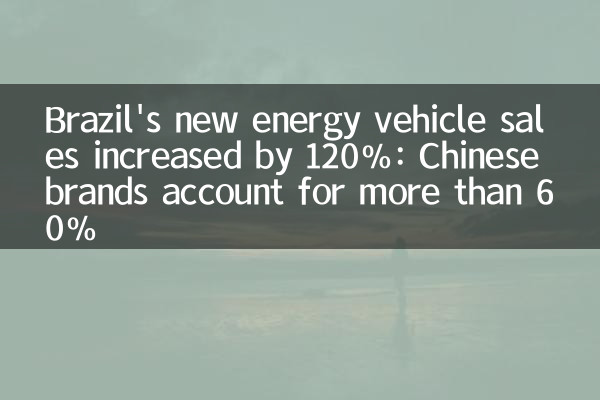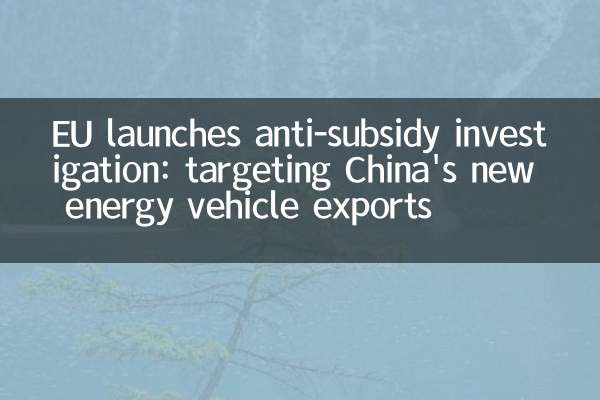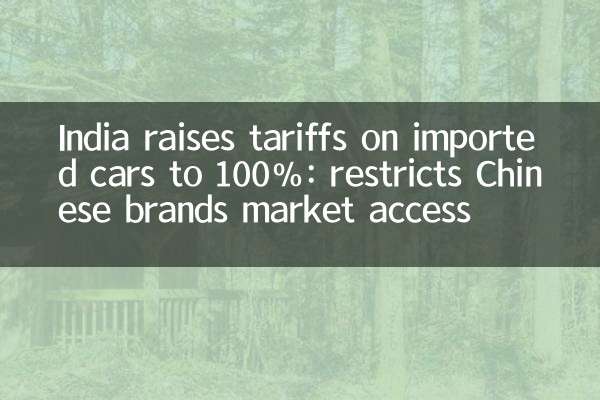Brazil's new energy vehicle sales increased by 120%: Chinese brands account for more than 60%
In recent years, the global new energy vehicle market has flourished, and Brazil, as the largest economy in South America, has also shown strong growth momentum. The latest data shows that Brazil's new energy vehicle sales increased by 120% year-on-year in the past 10 days, of which Chinese brands account for more than 60% of the market share. This phenomenon has attracted widespread attention. This article will combine structured data to deeply analyze the current status and future trends of the Brazilian new energy vehicle market.
1. Overview of Brazil's new energy vehicle market

According to the latest data released by the Brazilian Automobile Industry Association (ANFAVEA), Brazil's new energy vehicle sales reached 5,200 units in the first 10 days of October 2023, an increase of 120% year-on-year. This increase is mainly due to the support of government policies and the improvement of consumers' environmental awareness. The following are the specific data on Brazil's new energy vehicle sales:
| time | Sales (vehicles) | Year-on-year growth |
|---|---|---|
| First 10 days of October 2022 | 2,364 | — |
| First 10 days of October 2023 | 5,200 | 120% |
2. Performance of Chinese brands in the Brazilian market
The performance of Chinese new energy vehicle brands in the Brazilian market is particularly impressive. Data shows that Chinese brands account for more than 60% of Brazil's new energy vehicle market, among which BYD, Great Wall Motors and Chery Automobile are the three highest-selling brands. The following is the sales share of specific brands:
| brand | Sales share | Main models |
|---|---|---|
| BYD | 25% | Han EV, Yuan PLUS |
| Great Wall Motors | 20% | Ora Good Cat, Haval H6 New Energy |
| Chery Automobile | 15% | Tiggo 8 new energy |
| Other brands | 40% | — |
3. Factors that drive the growth of Brazil's new energy vehicle market
The rapid growth of Brazil's new energy vehicle market is inseparable from the following key factors:
1. Government policy support:In recent years, the Brazilian government has introduced a series of policies to encourage the consumption of new energy vehicles, including reducing import tariffs and providing car purchase subsidies. For example, in 2023, the Brazilian government lowered the import tariffs for new energy vehicles from 35% to 10%, significantly reducing the cost of consumers to buy cars.
2. Improve consumers' environmental awareness:As global climate change problems become increasingly serious, Brazilian consumers' environmental awareness is gradually increasing. Many consumers will give priority to new energy vehicles with better environmental performance when buying cars.
3. Price advantages of Chinese brands:With its mature technology and large-scale production, China's new energy vehicle brands have obvious advantages in price. For example, BYD Yuan PLUS is priced at about 200,000 real (about 280,000 yuan), while similar European brands are generally priced at more than 300,000 real.
4. Future prospects
Looking ahead, Brazil's new energy vehicle market still has huge growth potential. According to industry forecasts, by 2025, Brazil's annual sales of new energy vehicles are expected to exceed 100,000 vehicles, and its market share will further increase. Chinese brands will continue to play an important role, and localized production may also become a trend. For example, BYD has announced that it will establish a production base in Brazil to further reduce costs and enhance market competitiveness.
5. Summary
Brazil's new energy vehicle market has shown explosive growth under the multiple driving force of policies, consumer awareness and brand competition. Chinese brands have become the dominant force in the market with their technological and price advantages. In the future, with the further maturity of the market, Brazil is expected to become an important growth pole in the global new energy vehicle market.

check the details

check the details